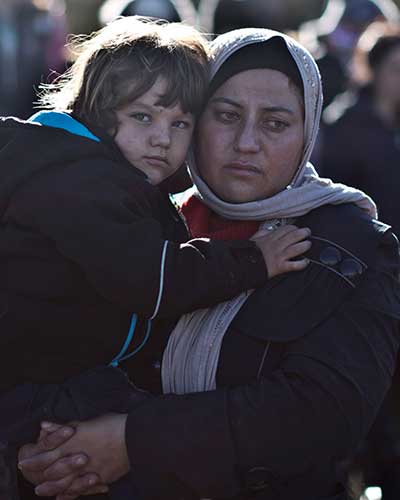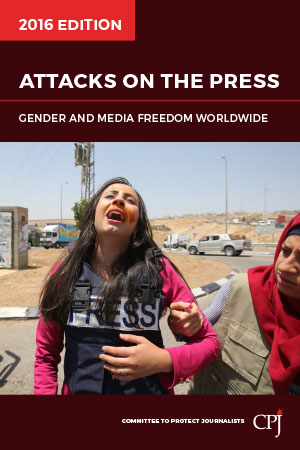Inside a four-room apartment in Antakya, Turkey, a town on the border with Syria, more than a dozen men sat on mattresses on the floor. It was just past 10 p.m. and the soldiers, all men in the Free Syrian Army, the rebel opposition group in Syria, were busy coordinating their next trip into the country. The sound of metal clinking emanated from a back room where younger recruits were assembling Kalashnikovs and shoulder-fired missiles.
It was my first interview with a military commander, not just in the Syrian civil war, but in any war. I was 22, looked about 15, but felt older. Never before had I interviewed a soldier. At the time, I didn’t fully understand war. I didn’t have friends who had served and I didn’t know anyone personally fighting in Syria. Yet I was there to interview Riad al-Ahmed, a commander of a battalion in the Free Syrian Army, with another young female journalist and a man who was our Syrian fixer.
We were only allowed to interview al-Ahmed at night at the Antakya house that fighters used to take a break from the fighting. Al-Ahmed was one of the most powerful commanders in the spring of 2012. He had defected from the Syrian army, led by President Bashar Assad, in November the year before (he would be killed in 2013).
When we walked into the house in the spring of 2012, I was prepared for the interview to be a bit awkward. The likelihood was that these men would see me as young and foreign and as a woman, with views on gender that were likely very different than my own. I was nervous, and stumbled over my questions.

What I did not expect was to be almost completely ignored, even though I made an effort to introduce myself in Arabic and to strike up a casual conversation, but the men in the room seemed more interested in talking with my male fixer.
What I found most nerve-racking were the questions they posed when they did acknowledge my presence.
“Wow, you are so young,” al-Ahmed said. “You girls are the first women I have had interview me.” He then asked questions I hear in almost every interview I have with male soldiers: Are you married? Do you have kids? My answer is always the same: Yes and yes. In fact, I am not married and do not have children.
An older female correspondent had advised me to wear a wedding ring at all times and to carry a picture of children in my bag, in case someone asked. Somehow, she told me, doing so “makes soldiers respect you more.” It seemed to work. The interview went on without a hitch once I answered all of al-Ahmed’s questions to his satisfaction and told him about the fake toddlers I had waiting back home.
Quite simply, throughout the interview, I became acutely aware of the fact that they didn’t think I fit in. I was young and I was female-two characteristics that have consistently caused problems for me throughout my career.
From speaking with women my age in the field, whether reporting in Cairo’s Tahrir Square, Aleppo, Baghdad, or a house in Antakya, there is one feeling that seems to have stuck with us throughout our reporting in the Middle East: our gender is often seen by those around us, including many of our male sources, in the same way as our youth and inexperience.
I got my first taste of this in my interview with al-Ahmed. I learned later that there were certain details in that interview that al-Ahmed would hold back, that he would twist.
The interview with al-Ahmed lasted for nearly three hours. I asked all the questions I had written down in my notebook and he gave me information I thought, at the time, was secret and valuable. I came to find out years later, after he died, that al-Ahmed exaggerated certain details. He was not who he said he was. When I returned to report on his death, I learned that he had lied to me and told a male colleague, just a few years older than me, the truth.
I never understood why many of the male soldiers I met in the Middle East tended to exaggerate their status, their role in their battalions, and the events that surrounded certain battles. Maybe they thought I would never find out the truth. Maybe they were trying to impress me. Or maybe they just wanted to get noticed in the press. Whatever the case, it has happened consistently during the past five years.
There’s an assumption, one of the men who fought under al-Ahmed’s direction told me, that if I did not spend time embedded with them on the front lines, like many of our male colleagues had, I would not know the truth from a lie. Implicit in his comment was that I would have to do what the male reporters had done to earn their respect.
And so, I began embedding with rebels in Syria and Iraq, where I did earn the respect of my military sources-a process many of my male colleagues never had to go through. My male counterparts could sit down for an interview in the same house in Antakya and automatically earn the respect and the truth in one sitting.
Once I reached the frontlines, I experienced an entirely different tone from my interview subjects. There, male fighters constantly told me: “Good for you for being out here” or “Now you probably understand better.”
On the flip side, my male colleagues could not as easily speak with female sources, especially in precarious living situations such as refugee camps, war zones, or training camps. As a woman, I am able to gain access to the women and girls that are often asked to sit in a side room while I interview their father, brother or uncle. As a woman, I can sit with a mother and her children alone without her husband and speak to her candidly. I can ask her about her daily life and how she gets by day to day. Women often feel comfortable sitting with me and talking about their mental state and struggles with post-traumatic stress disorder. They tell me tales of sleepless nights and wetting the bed every time a plane flies by. They find comfort in speaking with female journalists because of the divide between men and women in their own culture. That comfort provides me with access to stories about the broader implications of conflict than are available to journalists who are limited to interviewing soldiers.
At a makeshift refugee camp on the border of Syria and Turkey, I sat with a woman and her three children in a tent. The woman, Fatima, had been living in the camp for nearly a year. Her husband was in Aleppo fighting the Islamic State group. She was alone in the camp with no money and no reliable way to get food for her children.
Despite our ability to talk openly about her sexual abuse in the camp and her husband’s absence, she too asked me up front: Are you married? Do you have children?
Fatima asked me this question the same day I found out the truth about al-Ahmed. When she asked, I smiled, surprised that a woman was asking me the same question I had pegged to male soldiers. This time, though, I told the truth. Maybe I was acknowledging the gender divisions I had experienced while interviewing in the Middle East-trusting a woman and writing off al-Ahmed.
After years of traveling and interviewing men and women across the Middle East, I came to realize that those two answers did not hold as much weight as I had thought. Al-Ahmed still lied, which pushed me to go to the frontlines and see things for myself. And with Fatima, the truth, my truth, made her more comfortable opening up to me.
In September 2015, I reported for two weeks from Munich and Budapest, where I interviewed unaccompanied minors-children who had made their way to Europe from places like Syria and Iraq, alone.
In Munich, I met a boy named Ali. He was 15 and traveled from Syria to Europe. He had been smuggled into Germany and hoped to eventually find a way to get his parents to join him in Europe. He told me harrowing stories of stolen passports and trafficking-all tales that could have put him in danger. After just two days, he trusted me enough to tell his story to the world. I verified Ali’s story with German authorities and his friends that traveled with him. Everything he told me was spot on, nothing embellished.
I have found that the only people I interview in the Middle East during wartime who consistently tell the truth, and disregard my gender, are children. Although gaining access to interview them can be difficult, children are typically honest, even when lying might benefit them.
Erin Banco is a Middle East reporter for International Business Times and holds a masters of public administration from Columbia’s School of International and Public Affairs.
